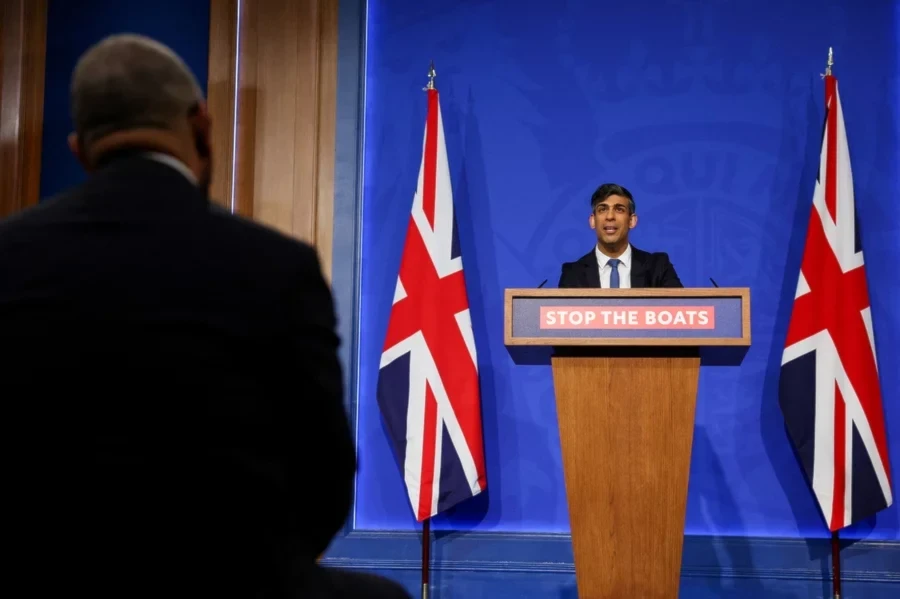UK passes controversial bill to deport asylum-seekers to Rwanda
The British government's proposal to deport asylum-seekers to Rwanda receives parliamentary approval on Tuesday after more than two years of debate
-

British Prime Minister Rishi Sunak speaks during a press conference in London on Monday regarding a treaty between Britain and Rwanda to transfer asylum-seekers to the African country. (AFP via Getty Images)
The British government's contentious proposal to deport asylum-seekers to Rwanda was granted approval by Parliament on Tuesday, over two years since its initial introduction.
The House of Lords, despite previously suggesting amendments, finalized its endorsement of the bill just after midnight, paving the way for it to become law.
Before his primary policy was ratified, British Prime Minister Rishi Sunak made a public appearance on Monday, standing at a podium adorned with the phrase "stop the boats," echoing one of his fundamental campaign promises.
During a media briefing, he expressed unwavering determination to enact the legislation, asserting its necessity to dissuade individuals lacking visas from making the journey across the English Channel from France to England.
"No ifs, no buts. These flights are going to Rwanda," Sunak said.
Rwanda welcomes; UN, Council of Europe object
Commenting on the decision, the spokesperson for Kigali's government said Rwanda is "pleased" by the UK parliament's passage of a controversial bill aiming to deport asylum seekers to the East African country.
"We are pleased that the Bill has been passed by the U.K. Parliament," Yolande Makolo said in a statement, adding that the government in Kigali was looking forward "to welcoming those relocated to Rwanda."
However, the UN and the Council of Europe begged to differ, calling on the UK to reconsider.
Europe's highest rights body on Tuesday called on Britain to scrap a controversial plan to deport asylum seekers to Rwanda after the measure cleared parliament.
"The United Kingdom government should refrain from removing people under the Rwanda policy and reverse the Bill's effective infringement of judicial independence," the Council of Europe's Commissioner for Human Rights, Michael O'Flaherty, said in a statement.
On its part, the UN called on Britain to reconsider its plans, warning it threatened the rule of law and set "a perilous precedent globally."
The heads of the United Nations agencies for refugees and for human rights called on Britain to instead "take practical measures to address irregular flows of refugees and migrants, based on international cooperation and respect for international human rights law."
Dive deeper
The United Kingdom and Rwanda signed a migration agreement in 2022, under which people identified by the UK government as undocumented migrants or asylum seekers would be deported to Rwanda for processing, asylum, and resettlement.
The plan has drawn criticism from human rights organizations and some politicians who believe the measure will not help stem the flow of migrants.
The first deportation of migrants from the UK to Rwanda was scheduled for June 14, 2022. However, the flight was canceled at the last minute due to the European Court of Human Rights ruling.
In the same context, an advocate has asserted that the British government's plan to send asylum-seekers from the UK to Rwanda amounts to human trafficking.
Meanwhile, the UK government claims that the prospect of deportation to Rwanda will discourage migrants from undertaking the perilous journey across the Channel. Between January and March, over 4,600 migrants crossed the Channel, surpassing previous figures for the same period.
Critics and legislators contend that there is insufficient evidence to suggest that the plan would serve as an effective deterrent.
The Rwanda policy has incurred a cost of £220 million ($274 million) for the British government to date, and this expenditure could potentially escalate to £600 million after the initial deportation of 300 individuals to East Africa. Such financial implications have left Prime Minister Sunak vulnerable to criticism from both ends of the political spectrum. Critics argue not only that the policy breaches international human rights law but also that it represents a costly and inefficient approach. The opposition Labour Party, projected to secure victory in the upcoming general election, has already declared its intention to abolish the policy if it assumes power.
Read next: UK HRW chief: UK disrespecting human rights, must be stopped

 4 Min Read
4 Min Read








